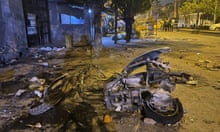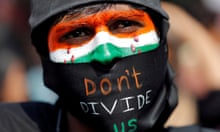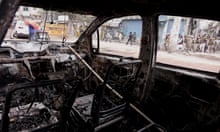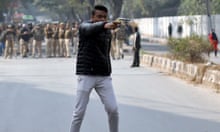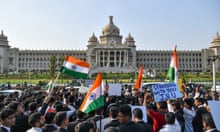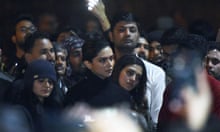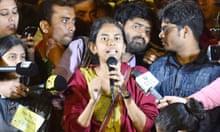Protesters in north-east India have set fire to tyres and cut down trees to block roads in a shutdown across the region hours after lawmakers approved the government’s new citizenship bill.
The legislation, set to go before the upper house on Wednesday, will fast-track citizenship claims from refugees from three neighbouring countries - but not if they are Muslim.
Islamic groups, the opposition, rights groups and others have said this fits into the Hindu nationalist agenda of the prime minister, Narendra Modi. They say he wants to marginalise India’s 200 million Muslims, something he denies.
People in north-east India object for different reasons, fearing that large numbers of Hindu migrants from Bangladesh, who they say are intruders, will be given citizenship.
On Tuesday, the region – sandwiched between Bangladesh, China and Myanmar – was crippled by a general strike called by dozens of organisations. Bus services were halted and most schools and shops were shut.
“The bandh [strikes] have drawn a total response in the north-eastern states,” said Samujjal Bhattacharyya, from the powerful umbrella group the North East Students’ Organization. “We have made it clear ... that CAB [the citizenship amendment bill] will not be accepted and we are going to intensify our agitation,” he told AFP. “Assam and north-eastern states had already taken a huge burden of illegal foreigners,” he said.
India’s lower house passed the bill just after midnight after a fierce debate in which one Muslim MP compared the government to the Nazis.
The law would make it much easier for Hindus, Sikhs, Buddhists, Jains, Parsees and Christians fleeing Afghanistan, Bangladesh and Pakistan to be given Indian citizenship.
Modi’s government says Muslims are excluded because they do not face persecution in these three countries.
ProfileNarendra Modi
Show
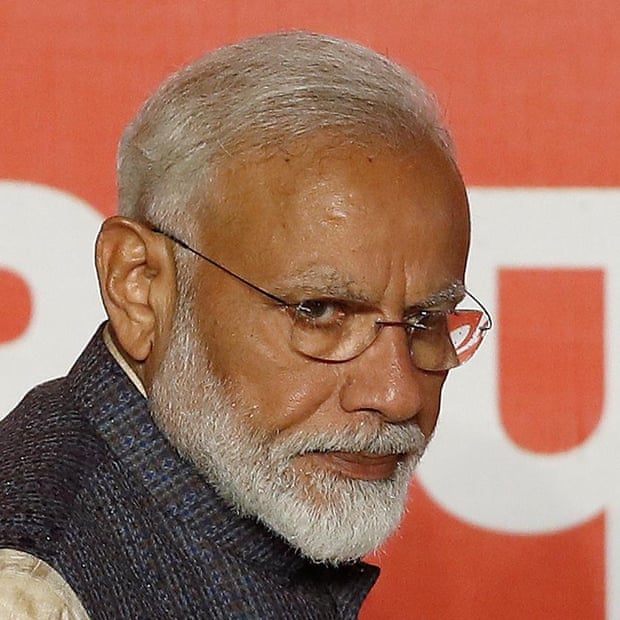
The boy who once sold tea at a railway station has become the most influential Indian leader in generations, winning a landslide in the 2019 elections. Or so goes the story that has become the core of Narendra Modi’s extraordinary appeal.
Modi was born in 1958 to a poor family in western India’s Gujarat state, where he developed a strong dislike for the ruling Congress party as a result of hanging around a political office near his father’s tea stall.
While still a child, he started attending daily meetings of the Rashtriya Swayamsevak Sangh, said to be the world’s largest volunteer organisation, whose Hindu nationalist ideology envisions the country’s diverse Hindu population as a single nation with a sacred culture that should be given primacy in India.
Hindu nationalists were sidelined by India’s founding prime minister, Jawaharlal Nehru, whose vision of India was of a secular nation at ease with its bewildering plurality. Their parties, including Modi’s Bharatiya Janata party (BJP), struggled to win more than 10% of the national vote for decades until the 1990s, when they started to expand on the back of a national campaign to demolish a 16th-century Mughal mosque and replace it with a Hindu temple.
BJP’s support was limited to wealthier Hindus in the country’s north and west, with resistance to the party from poor, marginalised Hindus, Muslims and south Indians thought to be permanent hurdles to Hindu nationalist domination.
Modi’s magnetism, especially his personal branding as a tea boy who climbed to the country’s highest ranks, has changed those calculations, drawing vast support from the country’s emerging middle and lower-middle classes. Young Indians had grown up being told their country was on the cusp of becoming a superpower. In Modi they had a leader who spoke as if it already was.
Alongside aspiration, the BJP promotes a vision of Hindu cultural supremacy that sidelines the country’s 300m minority population. As chief minister of Gujarat state, Modi was a firebrand Hindutva campaigner. In 2002, anti-Muslim riots in his state killed at least 1,000 people, resulting in the future prime minister becoming an international pariah who was banned from entering the US.
In response, Modi presented himself as an outsider being attacked by elites: a refrain that would become a central part of his political messaging, that he was constantly being targeted by the English-speaking media out of Delhi.
When popular disgust at corruption scandals plaguing the previous Congress government boiled over into street protests in 2011, it provided the rightwing populist leader a national springboard. His mastery of political theatre, and finger on the pulse of Indians, has now secured him the strongest mandate of any leader in decades.
Michael Safi in Delhi
Other minorities fleeing other countries, such as Tamils from Sri Lanka, Rohingya from Myanmar and Tibetans from China, are also excluded.
“This bill is in line with India’s centuries-old ethos of assimilation and belief in humanitarian values,” Modi tweeted.
The home minister, Amit Shah, told parliament: “I say this again and again that this bill has nothing to do with the Muslims in this country.”
Shah has stoked further fears among India’s Muslims with his aim to conduct a nationwide national register of citizens that he says will exclude all “infiltrators” by 2024.
On Monday, almost 1,200 scientists and scholars at institutions in India and abroad published a joint letter expressing their dismay at the legislation, saying the constitution called for members of all faiths to be treated equally.
On Monday, the US Commission on International Religious Freedom called for sanctions against Shah and said the bill was a “dangerous turn in [the] wrong direction”.
It said the legislation, together with the proposed register, was creating a religious test that would strip Indian citizenship from millions of Muslims.
Imran Khan, Pakistan’s prime minister, tweeted that the legislation from India’s “fascist” government violated all norms of international human rights law and bilateral agreements.

